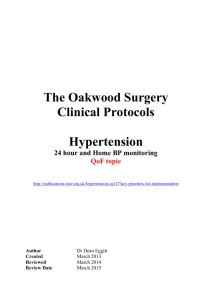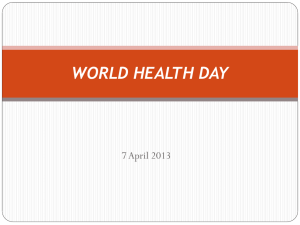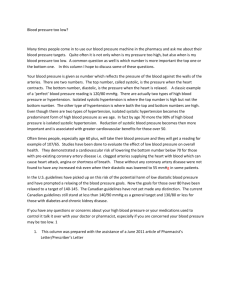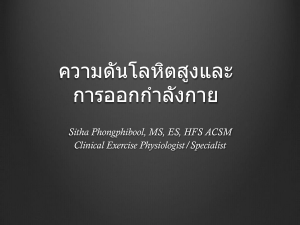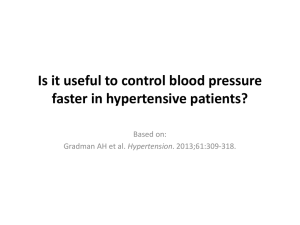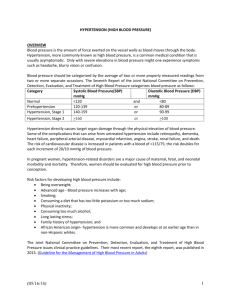Advances in Hypertension Research
advertisement
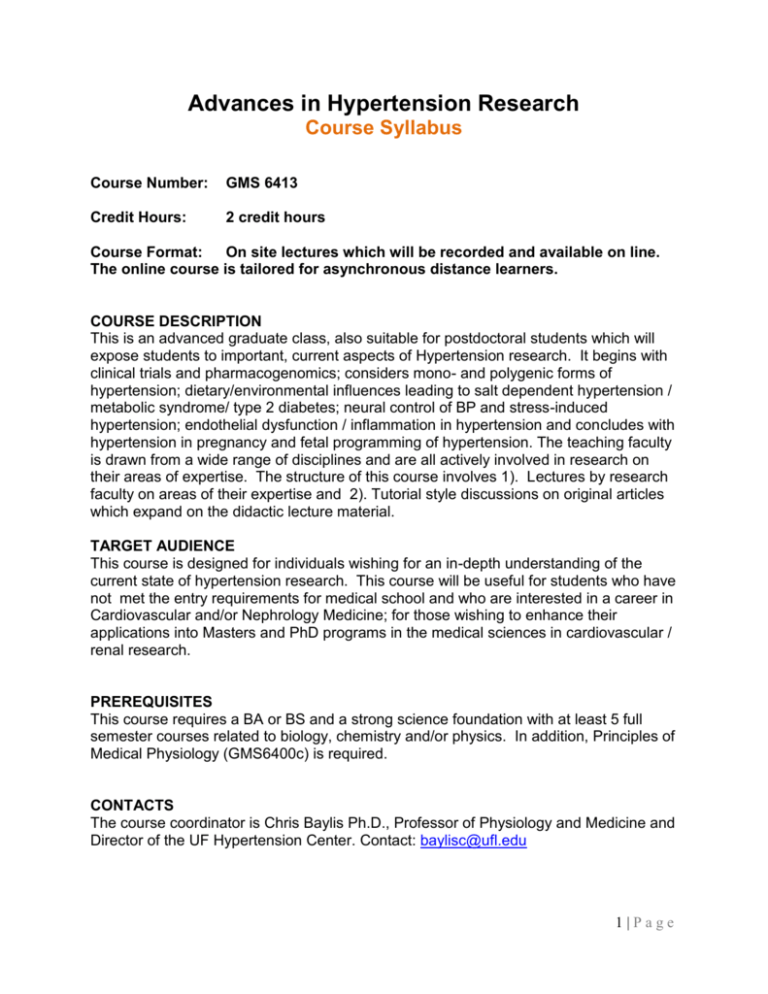
Advances in Hypertension Research Course Syllabus Course Number: GMS 6413 Credit Hours: 2 credit hours Course Format: On site lectures which will be recorded and available on line. The online course is tailored for asynchronous distance learners. COURSE DESCRIPTION This is an advanced graduate class, also suitable for postdoctoral students which will expose students to important, current aspects of Hypertension research. It begins with clinical trials and pharmacogenomics; considers mono- and polygenic forms of hypertension; dietary/environmental influences leading to salt dependent hypertension / metabolic syndrome/ type 2 diabetes; neural control of BP and stress-induced hypertension; endothelial dysfunction / inflammation in hypertension and concludes with hypertension in pregnancy and fetal programming of hypertension. The teaching faculty is drawn from a wide range of disciplines and are all actively involved in research on their areas of expertise. The structure of this course involves 1). Lectures by research faculty on areas of their expertise and 2). Tutorial style discussions on original articles which expand on the didactic lecture material. TARGET AUDIENCE This course is designed for individuals wishing for an in-depth understanding of the current state of hypertension research. This course will be useful for students who have not met the entry requirements for medical school and who are interested in a career in Cardiovascular and/or Nephrology Medicine; for those wishing to enhance their applications into Masters and PhD programs in the medical sciences in cardiovascular / renal research. PREREQUISITES This course requires a BA or BS and a strong science foundation with at least 5 full semester courses related to biology, chemistry and/or physics. In addition, Principles of Medical Physiology (GMS6400c) is required. CONTACTS The course coordinator is Chris Baylis Ph.D., Professor of Physiology and Medicine and Director of the UF Hypertension Center. Contact: baylisc@ufl.edu 1|Page SCHEDULE This is a half semester long course that is offered during the 1st part of the summer semester. It is designed to be taken as part of the Medical Physiology Certificate course and should be preceded by GMS 6400C, GMS 6410 and GMS 6414. COURSE GOALS Hypertension is a multifactorial disease and this course explores: 1). Some of the current treatments available. 2). How cardiovascular, neural, endocrine and renal function all influence blood pressure control. 3). How vascular endothelial dysfunction / inflammation are associated with hypertension. 4). How genetic, epigenetic and environmental factors can determine the level of the blood pressure. 5). The complexity of the factors that lead to hypertension. LEARNING OUTCOMES Upon completion of this course, students will be able to: 1. Understand how many individual body systems cooperate in the control of the normal blood pressure. 2. Understand how impairments in cardiovascular, neural, endocrine and /or renal function can lead to hypertension. 3. Understand why the majority of hypertension is classed as “essential” or of unknown origin. 4. Understand the role of genetic, epigenetic and environmental factors in the development of hypertension. 5. Develop an in depth understanding of some of the research contributions that are shaping our current views on high blood pressure causes and consequences. 6. Present individual research papers in a critical manner and in the context of the material already discussed LEARNING RESOURCES 1. Live lectures will be provided on site and students in the online course will have the option of attending via webcam. The recorded lectures with PowerPoint presentations, will also be provided on the course website. 2. Tutorial (informal) discussions of research articles will be available in real time using webcam. The real time sessions will also be recorded and posted online. 3. Online Q/A bulletin board and discussion website where students can post questions, which faculty will answer within the bulletin board. 4. There is no textbook for this course. Lectures will be accompanied by notes in PowerPoint format. References for original articles will be provided which students can access through the PUBMED using the University of Florida log-on. EXAMINATIONS AND GRADING A numerical grade will be given at the end of the module and will represent an average between the grades of all participating faculty. There will be 2 “short note” and multiple choice type exams during the course, all are open book, and each is worth 45% of the 2|Page final grade. There will be a written critique by each student of a specific paper that is related to the material that has been discussed and each presentation will account for 10% of the grade. Grading scale: A numerical grade will be given at the end of the course and will be scored as follows: 93-100% = A 90-92%= A87-89% = B+ 83-86% = B 80-82% = B77-79% = C+ 73-76% = C 70-72% = C67-69% = D+ 63-66% = D <63% =E GRADING POLICY Failure to attend the live tutorial discussions and paper presentations will receive a 0 for that class. In some circumstances where an absence is essential this will be waived, but the student must obtain the prior approval of the instructor. ACADEMIC HONESTY Please review the complete policy of the University of Florida regarding academic dishonesty, found in the online student handbook at: http://www.dso.ufl.edu/judicial/pdffiles/handbook 2003.pdf Students are expected to abide by the University of Florida Academic Honesty Guidelines and to adhere to the following pledge: “We, the members of the University of Florida community, pledge to hold ourselves and our peers to the highest standards of honesty and integrity. On all work submitted for credit by students at the University of Florida, the following pledge is either required or implied: "On my honor, I have neither given nor received unauthorized aid in doing this assignment." Copyright © 2016 Department of Physiology and Functional Genomics, University of Florida All course content including faculty lectures are copyrighted, including handouts and spoken audiovisual representations. 3|Page Course Schedule for GMS 6413. “Advances in Hypertension Research”. Summer 2015 Dates May 11th – June 30th. Recommended Subject Teacher Duration of study Week 1. 5/11 – 5/17 Exam 1 will be posted. Paper for final critique will be posted 5/12 2pm 5/12 3pm 5/15 2pm Lecture: Introduction. Lecture: Clinical trials for therapy. Lecture: Pharmacogenomics and Hypertension. Tutorial : Introduction Baylis De-Hoff Gong Tutorial: Pharmacogenomics and Hypertension Lecture: Metabolic Syndrome and Diabetes How These Affect Hypertension Management Lecture: Single gene polymorphisms and Hypertension. Lecture: The kidney in Hypertension Gong Wingo 5/26 3pm 5/29 2pm 5/29 3pm Tutorial: Single gene polymorphisms and Hypertension. Tutorial: The kidney in Hypertension Lecture: Populations and HT Tutorial: Populations and HT Week 4. 6/1 – 6/7 6/2 2pm 6/2 3pm 6/7 6/7 Lecture: Salt dependent HT. Tutorial: Salt dependent HT. Exam 1 Due Exam 2 will be posted Weiner Weiner Lecture: Neural control of BP/ stress induced Hypertension Lecture: Endothelial dysfunction in Hypertension Tutorial: Neural control of BP/ stress induced Hypertension Tutorial: Endothelial dysfunction in Scheuer 5/15 3pm Week 2. 5/18 – 5/24 5/19 2pm 5/19 3pm 5/22 2pm 5/22 3pm Week 3. 5/25 – 5/31 5/26 2pm Week 5. 6/8 – 6/14 6/9 2pm 6/9 3pm 6/12 2pm 6/12 3pm Baylis De-Hoff Wingo Baylis Baylis Segal Segal Christou Scheuer Christou 4|Page Hypertension Week 6. 6/15 – 6/21 6/19 2pm 6/19 3pm Week 7. 6/22 – 6/28 6/23 2pm 6/23 3pm 6/26 2pm 6/26 3pm Week 8. 6/29 – 30 6/29 6/30 By 7/ 7 Lecture: Hypertension in pregnancy Tutorial: Hypertension in pregnancy Conrad Conrad Lecture: Fetal programming of Hypertension Tutorial: Fetal programming of Hypertension Lecture: Oxidative stress, inflammation and Hypertension Tutorial: Oxidative stress, inflammation and Hypertension Keller- Wood Keller- Wood Raizada/ Sumners Raizada/ Sumners Exam 2 due Paper Critique Due Final grade Please note that this is an advanced, up to date, research based course and the content will vary according to recent advances. 5|Page
